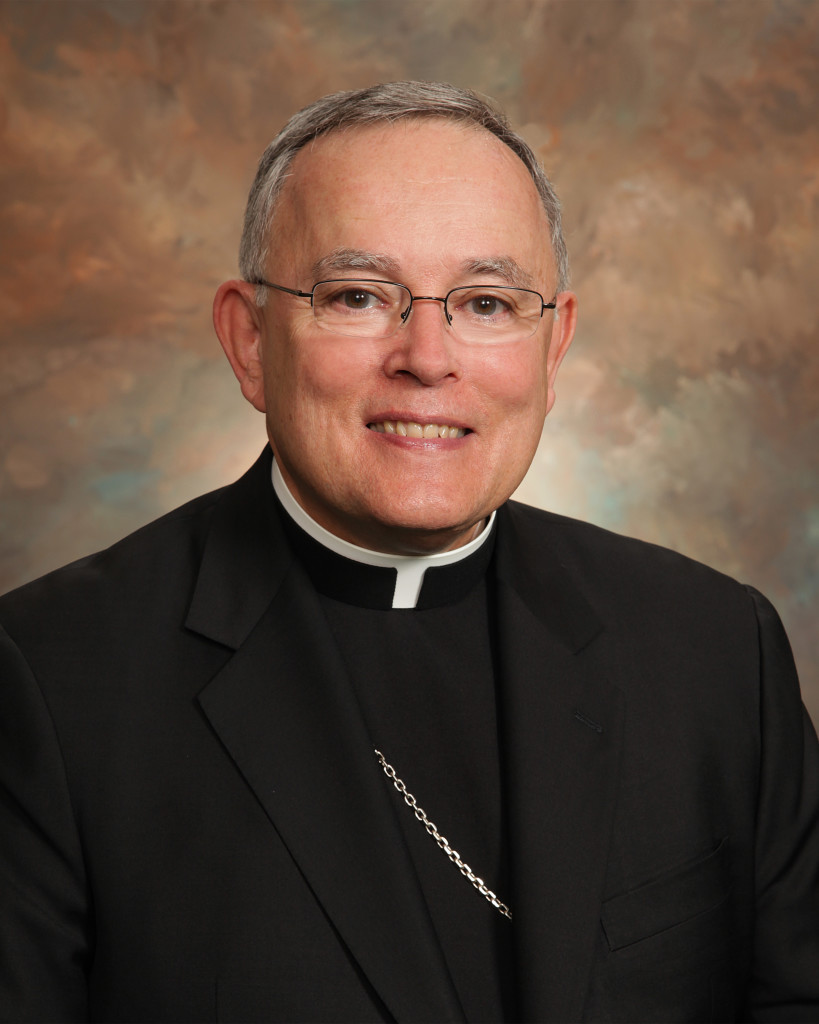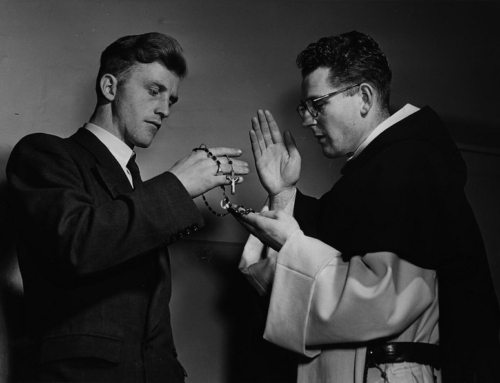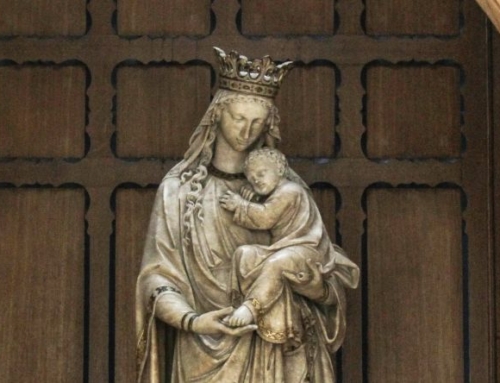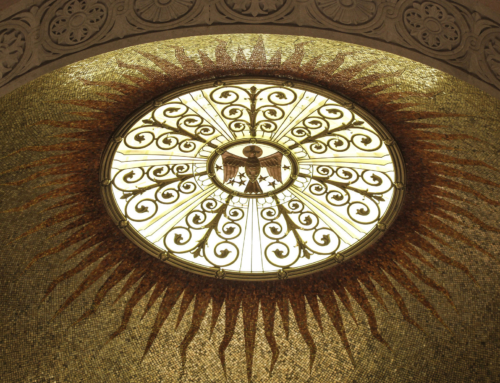In baptism, the Christian is conformed to Christ and anointed priest, prophet, and king: “These faithful [the laity] are by baptism made one body with Christ and are constituted among the People of God; they are in their own way made sharers in the priestly, prophetical, and kingly functions of Christ; and they carry out for their own part the mission of the whole Christian people in the Church and in the world” (Lumen Gentium 31). Priests and bishops, for their part, partake of Christ’s priesthood through not only baptism, as do the other faithful, but also through priestly and episcopal ordination. They are thus called to exercise gifts and roles in the person of Christ the head. Charles Chaput, a Capuchin friar (Franciscan) and Archbishop of Philadelphia, is widely recognized as a holy minister of sacramental life, a clear and cogent teacher and preacher, and pastorally present shepherd of his flock. From this vantage, Archbishop Chaput affords insight in what follows into the role of the Church in the modern world, contemporary emphases in Church doctrine and practice, and his ministry as a pastor and consecrated religious.
For young Catholics in search of cities with community, apostolate, and rich ecclesial life, Denver is at the top of the list. Many attribute its vibrant Catholic atmosphere, in part, to Pope St. John Paul II’s visit for World Youth Day in 1993 and, in part, more recently to the role you played as Archbishop in building up the Church in Colorado. For those looking to participate more fully in the Church’s renewal and evangelization efforts throughout America, what are some basic principles that you found effective in Denver?
World Youth Day ’93 was possible because my predecessor, Archbishop (now Cardinal) J. Francis Stafford, did a great job preparing for it. That meant dealing with some serious challenges in Denver’s local Church when he arrived in 1986, stemming back into the 1970s. So he deserves a lot of the credit.
It’s easy to build on a good foundation. By the time I became Denver’s archbishop in 1997, Cardinal Stafford and World Youth Day had provided that. People with good apostolic zeal sometimes forget that mission runs on resources. Good pastoral leadership requires good stewardship of material resources. Otherwise nothing can get done. I inherited a very healthy diocese when I arrived in Colorado. This made doing new things, interesting things, a lot easier.
My own formation as a religious probably helped. The Franciscans started out as a strange new idea. So I try to be open to new ideas, as long as the people having them are hard-working and responsible.
In terms of young people wanting to contribute to the work of the Church, the key things they need are persistence, patience and humility. The Church’s ministries are essential to her work. But they also tend to be heavy with inertia. Young people can do plenty of great apostolic things without getting absorbed into diocesan bureaucracies. If they’re motivated, they just need to start. And of course they need to be willing to drop or modify an idea if it clearly doesn’t work. Given human nature, that’s harder than it sounds.
That leads me to think about the invaluable stability that tradition imparts to Church teaching and pastoral practice. How has your sense of living tradition deepened in the course of your priesthood and episcopacy, particularly in the American context?
The American context is bad for tradition. George Grant, Christopher Lasch and a lot of others have noted that Americans really don’t like history because we don’t want to be encumbered by the past. Obama’s “hope and change” slogan in the 2008 election was an example. It was perfectly tuned to the American temperament. We like the idea of progress. We like the idea of change. We might be heading over a cliff, but it’s OK as long as it’s “forward”—and no surprise, “forward” was one of Obama’s 2012 slogans.
It’s not my intent to pick on the president. I’m simply noting the shrewdness of his insight into the American character. We don’t like to remember that we can’t reinvent ourselves. The past is annoying because it helps to define us. It places obligations on our actions here and now. So for Catholics—including priests and bishops—connecting with the Church’s living tradition is a matter of survival. It’s the counterweight to a peculiar American weakness. We can’t stay Catholic and American at the same time unless we swim against the cultural tide. Knowing our traditions as a Church enables us to do that.
The past few years of the culture wars have been largely disastrous for Catholics. With increasing confusion as regards man’s identity and sexuality, it is more and more difficult to effectively communicate the truth. For those hoping to transmit saving truth in the public square, what do you see as the most important intellectual and spiritual resources to maintain integrity and to communicate effectively?
People are converted by other people, not by tools or programs or special strategies. If you want to be a good apostle, pray, read and do the spiritual and corporal works of mercy. It’s no more complicated than that. If you don’t read, you can’t grow in your faith. The same goes for prayer and apostolic work. We can’t give to others what we don’t have ourselves. We can’t fix interior problems—starting with our own need for conversion and missionary witness—with external solutions. We communicate best with the purity and zeal of our own lives, not the ingenuity of our tools.
The Catholic Church numbers among its members many compelling witnesses and models of the sanctity you describe. There are few stars in the firmament who shine as brightly as St. Francis. With the Holy Father choosing the name Francis, some speak of the present as a “Franciscan moment” in the Church. Can you identify an element of St. Francis’s sanctity which we can seek presently to cultivate in our own life and witness?
That’s easy: his radicalism. By “radical” I mean committed zealously to the root; to the pure content of the Gospel and the pure example of Jesus Christ. A lot of modern Christianity, at least in the developed world, is a kind of Faith Lite. It can’t convert anyone else because we haven’t really let it convert us. St. Francis wanted none of that. He was hungry for the real thing; for the kind of zeal that comes from living the words of Jesus literally. We need to do that in our own lives, or at least have the appetite for holiness that makes real discipleship possible.
This year, the Order of Friars Preachers celebrates its 800th anniversary, just seven years after the Franciscan Order celebrated the same milestone. Eight centuries for both orders testifies to the enduring value and vigor of our charisms. Throughout their histories, Dominicans and Franciscans have contributed to the Church’s witness in sanctity, doctrine, evangelization, and apostolate. In what ways do you think the friars in particular can work together for the building up of the Church in their next 800 years?
Both communities were born in a hard period for the Church. They share a similar genius. Each in its own way was a radical recommitment to the truth of the Gospel and the person of Jesus Christ. Each was a radical reaffirmation of faith—in loyal service to the Church, even in spite of the Church. Again, that word “radical” is the key. It’s so easy to lose focus. Both communities have struggled over the centuries with the temptation to inertia. Time has a lot of aerodynamic drag, and it can wear down the soul.
I can only speak confidently about the United States, but I think the pastoral terrain for the Church here will become very hard very quickly over the next 20 years. It’s already happening.
And very few Catholics are ready for it. There’s no reason to lose hope—God is always with us—but it does mean that a witness of wholehearted, articulate fidelity will be vital in sustaining American Catholic life. Dominicans and Franciscans have been down that road before. I’m not smart enough to have a grand plan for working together, but I know that if we do work together whenever we can, our people will be the stronger for it.
The Church has turned her gaze intently upon the sacrament of marriage and its sanctity in the recent papal magisterium. As the future portends increasing difficulties for Catholics, and especially Catholic families, what advice would you give to young men and women just setting out on this adventure who may be fearful of what lies in store?
Focus on God first and each other second. Everything else comes after those two things on the priority scale, even children, because children learn how to love and sacrifice from watching their parents. That might sound simplistic, but there’s enormous power in little fidelities. Just saying the rosary together as a couple every day, year after year, shapes an eternity. Fear about what might happen in the future can steal the joy and beauty from the moments we have right now.
God never abandons couples who love him. So I try to tell young marrieds to fight against worrying about the future. Worry instead about the needs of your spouse and how to help him or her get to heaven. Life is about the other. That’s all marriage is: a uniquely intimate, beautiful friendship, deepening over the years; fertile in spirit and fertile in body. Lived well, good things follow— always.
To speak further of family life, you had the opportunity to attend the Ordinary Synod on the Family in October of this past year during which you spoke about your positive and collegial experience with the synod fathers. As the dust has settled and you have a better understanding of how the synod’s teaching has been received and explained, what do you think will be the enduring legacy of the synod’s deliberations?
That’s still unclear. The synod’s original working document was a decent draft text, but it had a lot of deficiencies. The synod fathers fixed most of those in the final materials, but the Church is in an odd moment. Even among some key bishops, theological formation is poor. Overall my experience of the synod was quite positive. I was very happy with the Holy Father’s encouragement of candid discussion because that’s the only way any real work can get done. But disagreements remain among the bishops on some very serious issues, so the synod’s “enduring legacy” will remain murky for some time.
In the past century, the sanctity and witness of the likes of Popes Sts. Pius X, John XXIII, and John Paul II have U.S. Catholics looking to Rome with greater interest. Also, with social communication which brings to us a steady stream of homilies, audiences, interviews, and pictures, the Pope feels nearer and more accessible than ever. It seems that this impression of nearness has proven very powerful for the people whom Pope Francis has touched. How do you think the Church can cultivate more broadly the impression, and indeed the actual reality, of nearness to the people of God?
The technologies you mention can be wonderful tools for deepening the Christian life and spreading the work of the Church. But the “nearness” you speak of depends finally on the character of the person that those technologies project. Pope Francis has a faith and personal joy that can’t be ignored because they’re authentic. They’re real. They come naturally from his heart. The Church draws near to people every time an ordinary Christian really lives like a follower of Jesus Christ. Again, there’s nothing more powerful than personal witness. That’s what gets attention. That’s what converts hearts. And we can do that right here and now, all by ourselves. Technology can help, but we’re the active agents.
In this Holy Year of Mercy, Pope Francis has called for the universal Church to “contemplate constantly the mystery of mercy.” In Philadelphia, you’ve placed a stress on adoration, confession, and works of mercy through a variety of diocesan liturgies and programs. How do you see the Year of Mercy promoting conversion and transformation in your Archdiocese and in the Church abroad?
The danger in any “Year of —” is that priests and people will receive it skeptically, as just another expression of bureaucratic programming. Every diocese has a number of efforts in place for celebrating the Year of Mercy, Philadelphia included. But the best way to live the year is to cultivate a regular reliance on the Sacrament of Penance. It’s the most powerful life-changer there is. Confession is an exercise in self-examination and repentance. When we understand our own need for forgiveness, it gets a lot easier to forgive and show mercy to others.
To download a printable PDF of this Article from
Dominicana Journal, Summer 2016, Vol. LIX, No. 1, CLICK HERE.




